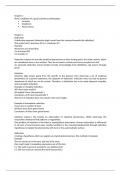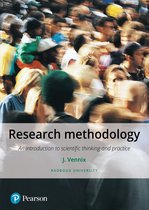Chapter 1
Three conditions of a good scientist or philosopher
Curiosity
Scepticism
Perseverance
Chapter 2
Deduction
A deductive argument (deductive logic) works from the universal towards the individual.
This works from 2 premises (P) to 1 conclusion (C)
Example:
All humans are mortal (P1)
X is a human (P2)
X is mortal ( C)
Deductive sciences do not take empirical phenomena as their starting point, but rather axioms, which
are considered more or less evident. They do not need a certain proof to be accepted as truth.
An axiomatic deductive science builds its body of knowledge from definitions and axioms through
proof.
Induction
Inductive logic means going from the specific to the general, from observing a set of empirical
phenomena to a general statement, the opposite of deduction. Induction does not lead to general
statements of which we can be certain. Therefore, a distinction has to be made between complete
and incomplete induction.
Example of complete induction:
All X have been studied
All studied X have characteristic Y
Conclusion, all X have characteristic Y
This form of induction does not contain much new insight.
Example of incomplete induction:
I have seen a number of trees
All those trees have green leaves
Conclusion: all trees have green leaves
Inductive sciences rely heavily on observation of empirical phenomena. While observing, the
researchers attempt to find patterns or regularities.
One problem of induction is the frank or unprejudiced observation. Human observation is influenced
in all sorts of (unconscious) ways. Another problem is the misunderstanding that through induction
hypotheses to explain the phenomena will more or less automatically surface.
Abduction
Creating a hypothesis which can explain an empirical phenomenon. (the method of analysis)
Example:
The sun comes up in the east, and sets it the west.
One could make 2 competing conclusions out of this fact.
C1: The earth must turn around the sun (Heliocentric)
C2: The sun must turn around the world (Geocentric)
,According to Ockham’s razor, if there are 2 explanations for the same phenomenon, we should always
take the simpler of the two, because the simples solutions are more likely to be correct.
Contexts
Context of discovery: The situation in which ideas and hypotheses are generated, which should
explain phenomena
Context of justification: The situation in which ideas, hypotheses and theories are tested against logic
and/or empirical evidence.
Core concepts is science:
Model
A simplified representation of a certain phenomenon
Law
Based on observation one establishes a certain pattern or regularity in empirical data
However, strong regularities are not laws
Experiment
An artificial research setting, created for the purpose of testing hypotheses. (pure observation)
Hypothesis
The preliminary stage of a theory or the consequence of a theory, a hypothesis which can be directly
tested against empirical reality.
Theory
Facts and statements need to be ordered in a logical, consistent whole. Such an ordered whole is
called a theory. It refers to contemplation rather than action. A theory is supposed to explain certain
phenomena.
A theory can be considered to be a coherent and consistent set of statements, incorporating
concepts, which can describe and explain certain phenomena.
A theory is a hypothesis which survived empirical testing.
A theory should also be parsimonious, which means that it should use as little concepts as possible
and it should have a large scope.
Chapter 3
Statements are either analytic or synthetic
Analytic: It does not have an empirical claim and its truth is independent of empirical
observations/facts. Its truth depends on a logical structure. It is a-priori (un)true
Synthetic: It does contain an empirical claim, and its truth depends on observation. It is a-posteriori
(un)true.
Logical positivism focusses on statements with an empirical claim, such a statement is cognitively
meaningful.
You need to know what to do in order to decide whether the statement is true or not. The principle
of verification plays an important role in logical positivism.
Critical rationalism
If a statement cannot be logically deduced (from what is known), it might nevertheless be possible to
logically falsify it.
A statement is scientific if it is falsifiable. This means that the statement can, in principle, be refuted
by empirical evidence
Statements and concepts
Science consists of concepts and statements with which we can describe our knowledge about the
world. We see our knowledge in the statements, which we can make about reality.
, With regard to research methodology, two types of classifications are relevant:
Individual vs. universal
Empirical vs. non-empirical
Individual vs. universal
Individual concepts refer to one concept. (Planet mars f.e.) Researchers using individual concepts
tend to focus less on similarities between phenomena and more on the dissimilarities.
Universal concepts refer to a class of objects. (planet f.e.) Trough abstraction, concentrating on
characteristics which individual objects have in common. In universal concepts, statements should
apply to as many instances as possible.
Empirical vs. non-empirical
Empirical concepts refer to what can be immediately observed in reality. (chair/tree/house/etc.)
Non-empirical concepts do not refer to experiential reality. They subdivide into 2 categories:
Logical/mathematical concepts, which originate independently of observation
hypothetical concepts, which assume the existence of something which is not observable. (gravity)
Types of statements
singular, particular and universal
Factual and normative
Static and dynamic
Descriptive and explanatory
Singular, particular and universal
Singular statements refer to one object or one case.
Particular statements refer to all cases of a particular category.
Universal statements refer to conditions, if-then.
Singular statements demand that only one case is investigated case study research
Universal and particular statements demand that all cases need to be investigated survey research,
among a population
Factual, opinion and normative statements
A fact refers to an event or situation, which is known or proved to be true.
If a factual statement cannot be verified that it is based on facts, the statement is an opinion.
A normative statement can easily be recognised by words like ‘should’ or ‘ought to’. These statements
express a value judgement. They cannot be true or untrue. You can agree or disagree with them, but
you cannot find empirical evidence with which the veracity of the statement can be established.
Static and dynamic statements
Static statements refer to a situation at a particular moment in time (cross-sectional)
Dynamic statements compare 2 or more situations over time. It reveals a change over time.
(longitudinal)
Descriptive, prescriptive and explanatory statements
Descriptive statements give a fact, but do not explain why.
Explanatory statements do explain, they reveal the causes of phenomena that we observe
Prescriptive statement is a recommendation that, if a course of action is taken, then a desirable
outcome will likely occur.
The deductive-nomological model (D-N model):
C1, C2, C3…. Statements about antecedent conditions






